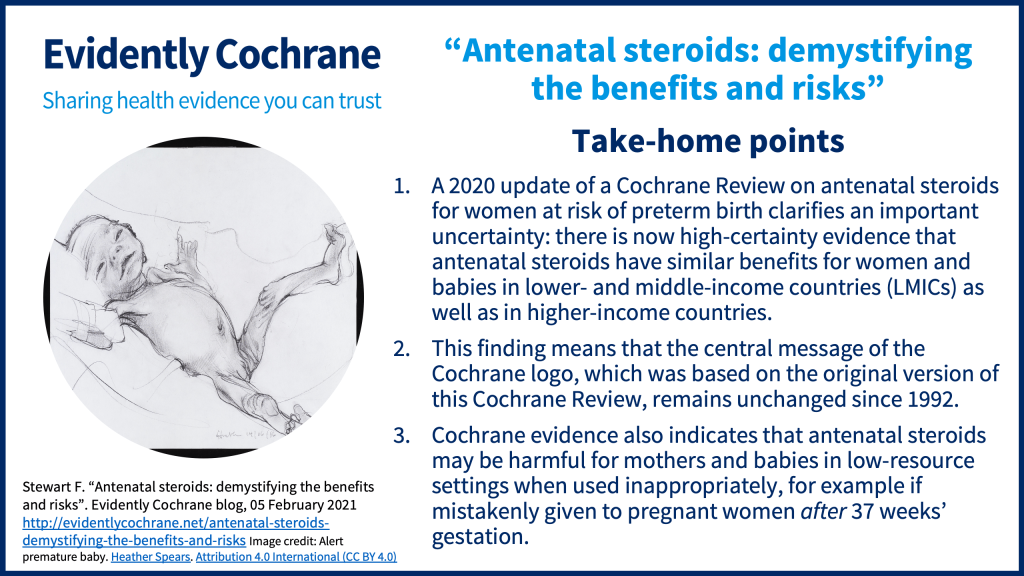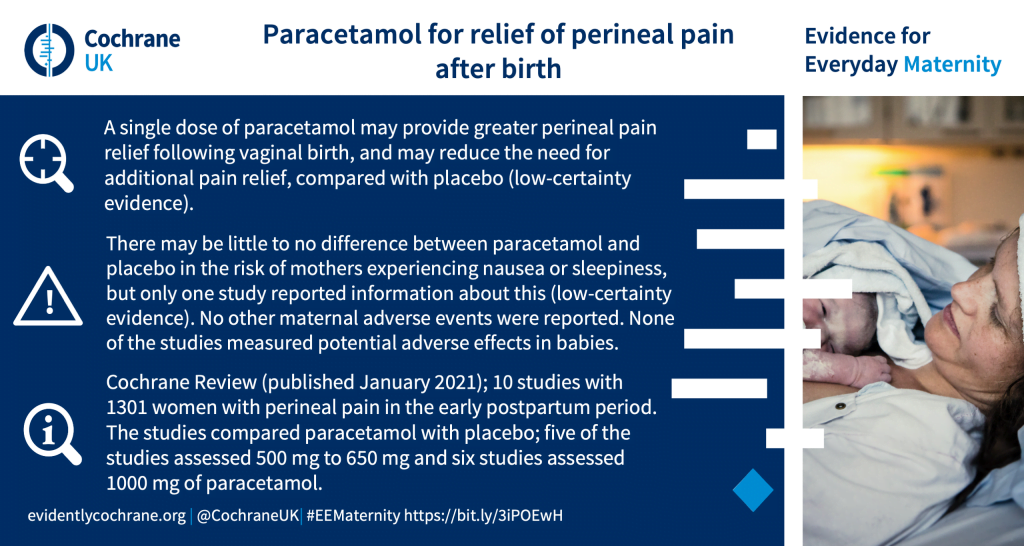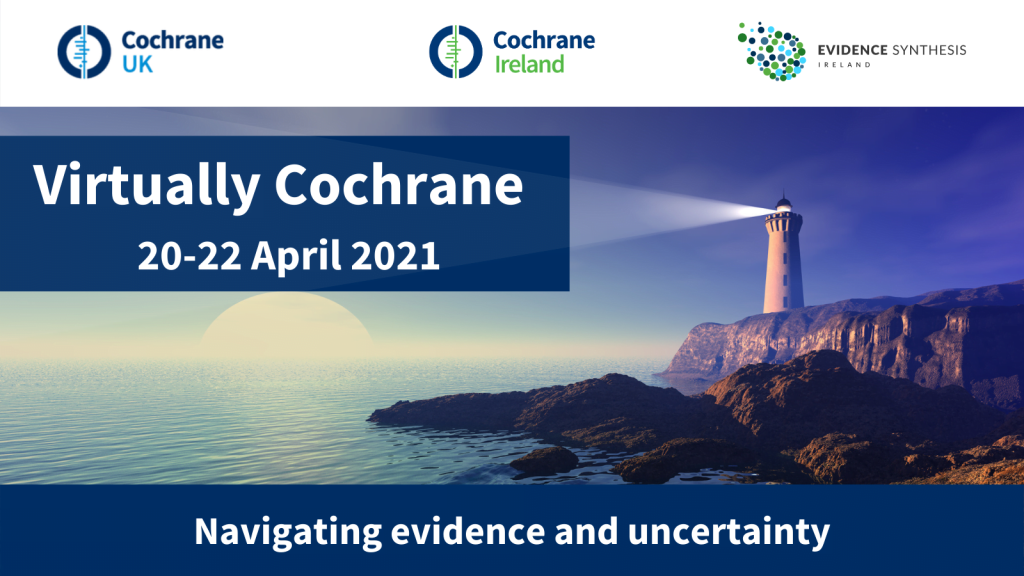The latest evidence and resources for midwives and clinical support staff. You can either scroll through this page or click on any of the links below to jump to the relevant section.
Please note, unlike the rest of our blogs, our ‘Evidence for Maternity Care: new evidence and resources’ blogs will not be updated.
COVID-19
.
COVID-19
Cochrane is producing reviews and resources for the COVID-19 pandemic. We have blogged about many of them and this blog COVID-19 evidence: a Cochrane round-up brings together a large collection of evidence and resources, starting from when this evidence was first being produced in spring 2020. Like the reviews themselves, all our blogs are updated to reflect new evidence.
Cochrane’s response to the pandemic had to meet the needs of evidence users and decision‐makers as it developed and how this is being done is discussed in an Editorial COVID-19: working together and making a difference for decision-makers. Cochrane has also signed on to the World Health Organization’s call for action about managing infodemics and WHO’s Vaccine Equity Declaration. You may also be interested to know about iHealthFacts, an online resource where anyone can ask for the evidence behind health claims. Read more in Cochrane Ireland vs COVID-19: iHealthFacts.ie ‘fact checking’ claims in a pandemic.
The ‘PregCov-19’ living systematic review project
“It is critical to determine how COVID-19 affects pregnant women and their babies. A regular systematic review methodology is not sufficient to synthesise the overwhelming amount of evidence produced daily worldwide. Cochrane Gynaecology and Fertility needed to carry out a living systematic review, meaning the review would be continually updated, incorporating new studies as they become available.” Read more in Cochrane Gynaecology and Fertility vs COVID-19: Collaborating to produce the ‘PregCov-19’ living systematic review.
Cochrane Special Collections
Cochrane Special Collections assemble Cochrane Reviews on important topics for the prevention and treatment of COVID-19. They are developed with experts from our global Cochrane network. They are based on World Health Organization interim guidance, and continuously updated. You can find Coronavirus (COVID-19) Special Collections here.
Cochrane Podcasts
Cochrane COVID-19 Podcasts offer short summaries of Cochrane COVID-19 reviews from the authors themselves. A good way to hear the latest Cochrane evidence in under 5 minutes each.
Cochrane Clinical Answers
Cochrane Clinical Answers (CCAs) provide a readable, digestible, clinically-focused entry point to rigorous research from Cochrane Reviews. They are designed to be actionable and to inform point-of-care decision-making.
Each CCA contains a clinical question, a short answer, and data for the outcomes from the Cochrane Review deemed most relevant to practising healthcare professionals. The evidence is displayed in a user-friendly tabulated format that includes narratives, data, and links to graphics.
You can find Cochrane Clinical Answers related to COVID-19 here.
Best of the Cochrane Library
Best of the Cochrane Library: 2020 in review
Antenatal care
Antenatal steroids for reducing risk of infant mortality and morbidity
Antenatal steroids: demystifying the benefits and risks is a blog for pregnant women and the people involved in their care by Fiona Stewart, Cochrane Network Support Fellow, looking at the latest Cochrane evidence from a review she co-authored on antenatal corticosteroids for women at risk of preterm birth and how it links to the Cochrane logo.

Featured review: Antenatal corticosteroids for accelerating fetal lung maturation in women at risk of preterm birth
You can also see a visual abstract of this review, listen to a podcast: What are the benefits and risks of giving corticosteroids to pregnant women at risk of premature birth? (also available in Spanish) and read a personal impact story, Wearing Cochrane evidence.
Cochrane Clinical Answer: What are the benefits and harms of administering corticosteroids to pregnant women who are at risk of preterm birth?
Venous thromboembolism prophylaxis
Cochrane Review: Venous thromboembolism prophylaxis for women at risk during pregnancy and the early postnatal period (March 2021)
Labour and birth
Antibiotics to prevent infection at caesarean section
Cochrane Review: Different classes of antibiotics given to women routinely for preventing infection at caesarean section (March 2021)
Management of the third stage of labour
Cochrane Clinical Answer: For women in the third stage of labor, how does intravenous (IV) compare with intramuscular (IM) prophylactic oxytocin?
Postnatal care and care of the newborn
Antidepressant treatment for postnatal depression
Cochrane Review: Antidepressant treatment for postnatal depression (February 2021)
Breast engorgement
Cochrane Podcast: Treatment for breast engorgement (overfull, hard, painful breasts) in breastfeeding women
Diet – preterm infants
Cochrane Reviews:
Enteral zinc supplementation for prevention of morbidity and mortality in preterm neonates (March 2021)
High versus low medium chain triglyceride content of formula for promoting short‐term growth of preterm infants (February 2021)
High versus standard volume enteral feeds to promote growth in preterm or low birth weight infants (March 2021)
Individualized versus standard diet fortification for growth and development in preterm infants receiving human milk (November 2020)
Cochrane Clinical Answers:
Head positions during nursing
Cochrane Clinical Answer: How do different head positions during nursing compare for improving outcomes for preterm infants?
Interventions to prevent cerebral palsy
Cochrane Clinical Answer: What are the effects of interventions to prevent cerebral palsy in preterm or low birth weight infants?
Cochrane Clinical Answer: What are the effects of interventions to prevent cerebral palsy in neonates with perinatal asphyxia or evidence of neonatal encephalopathy?
Lung recruitment manoeuvres in mechanically ventilated neonates
Cochrane Review: Lung recruitment manoeuvres for reducing mortality and respiratory morbidity in mechanically ventilated neonates (March 2021)
Management of transient tachypnoea of the newborn
Cochrane Review: Fluid restriction in the management of transient tachypnea of the newborn (February 2021)
Cochrane Review: Salbutamol for transient tachypnea of the newborn (February 2021)
Nutrition education
Cochrane Clinical Answer: How does nutrition education compare with conventional management for improving nutritional outcomes in term‐born infants?
Pain due to uterine cramping/involution
Cochrane Clinical Answer: How do NSAIDs compare with placebo or codeine for reducing pain due to uterine cramping/involution after birth?
Perineal pain after birth
Oral non-steroidal anti-inflammatory drugs
For this Cochrane Review: Oral non‐steroidal anti‐inflammatory drugs (single dose) for perineal pain in the early postpartum period (January 2021) there is a short video summary below.
Single dose paracetamol
Cochrane Review: Paracetamol/acetaminophen (single administration) for perineal pain in the early postpartum period (January 2021)

Probiotics for prevention of necrotising enterocolitis
Cochrane Podcast: Probiotics for prevention of necrotising enterocolitis in very preterm or very low birthweight infants
Skin care intervention to prevent eczema and food allergies
Featured review: Does moisturising baby skin prevent eczema or food allergies?
Cochrane Clinical Answer: For infants, what are the effects of skin care to prevent or reverse an impaired skin barrier on the development of eczema and food allergies?
Symptomatic patent ductus arteriosus
Cochrane Review: Indomethacin for symptomatic patent ductus arteriosus in preterm infants (January 2021)
Vitamin D supplementation
Cochrane Review: Vitamin D supplementation for term breastfed infants to prevent vitamin D deficiency and improve bone health (December 2020)
Coming up
Virtually Cochrane: an online event
Registration is open for ‘Virtually Cochrane’, an online event for all those involved with, or interested in, planning, doing, sharing and using health and healthcare evidence. It will take place on 20 – 22 April 2021. You can read all about it, and register, here.

The next collection of evidence will be published here in July 2021. We may have new blogs and blogshots on individual reviews meanwhile. You can find all our blogs relevant to maternity care here and blogshots here.
Join in the conversation on Twitter with @CochraneUK, @CochranePCG, and @CochraneNeonate or leave a comment on the blog.
Please note, we cannot give specific medical advice and do not publish comments that link to individual pages requesting donations or to commercial sites, or appear to endorse commercial products. We welcome diverse views and encourage discussion but we ask that comments are respectful and reserve the right to not publish any we consider offensive. Cochrane UK does not fact check – or endorse – readers’ comments, including any treatments mentioned.
Sarah Chapman and Selena Ryan-Vig have nothing to disclose.



This is an amazing work and I enjoyed reading, as Doula who work with nonprofit community, I highly recommend this kind of work.